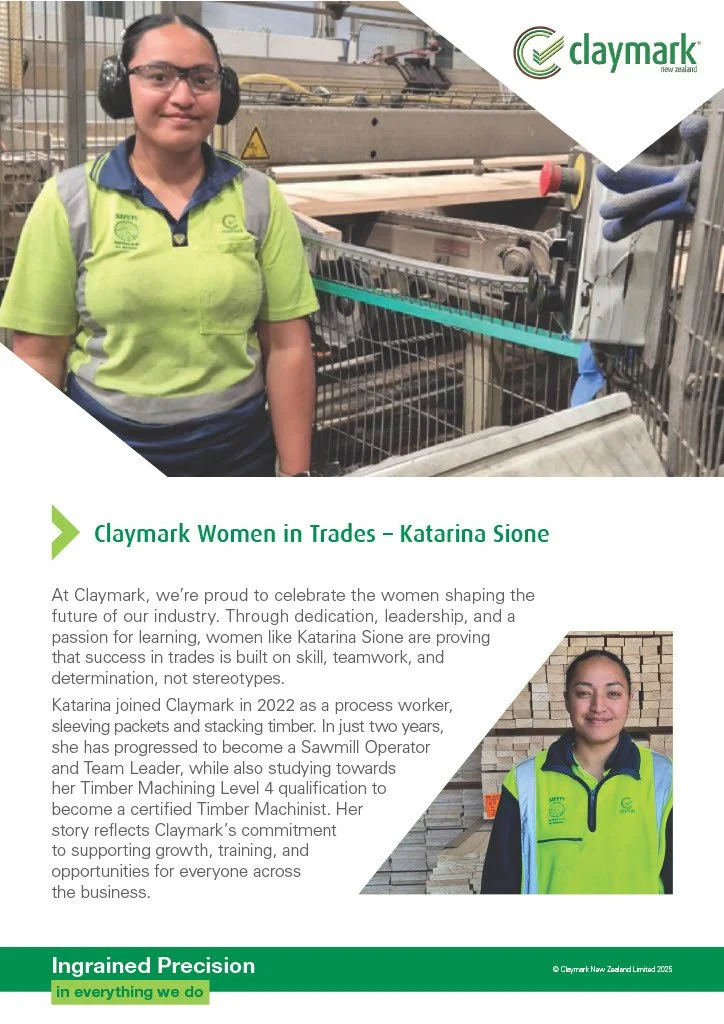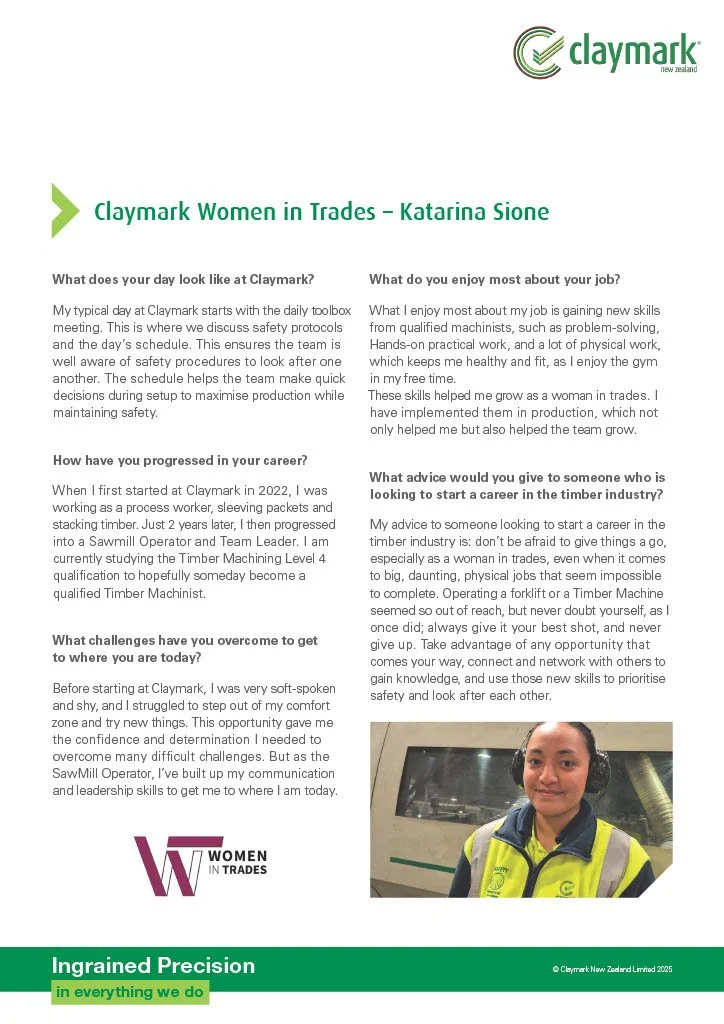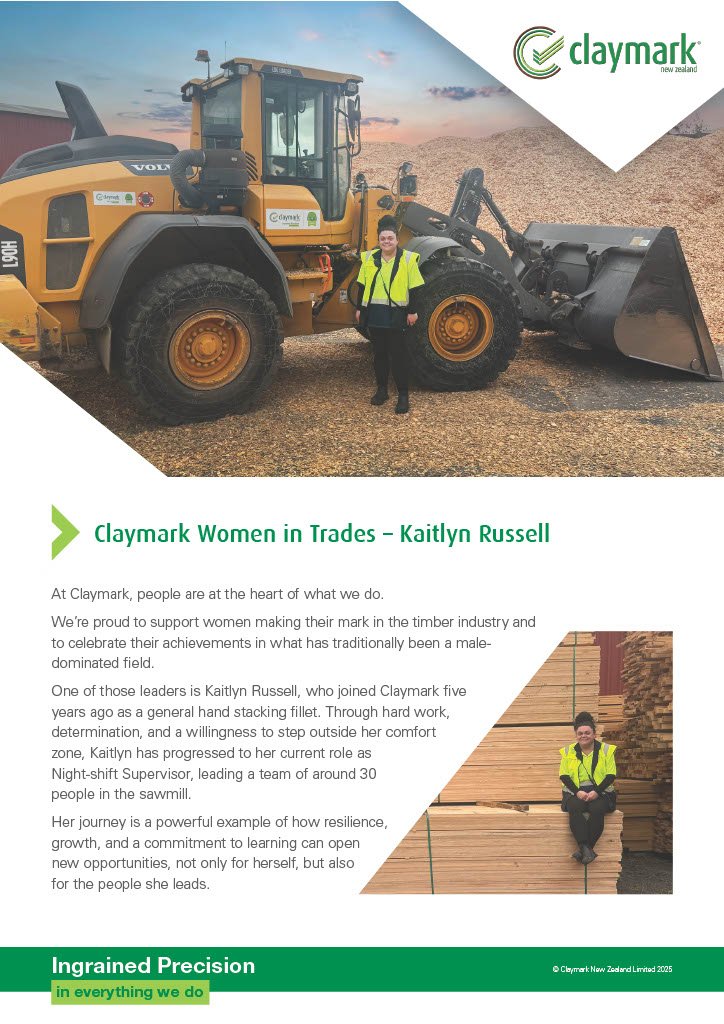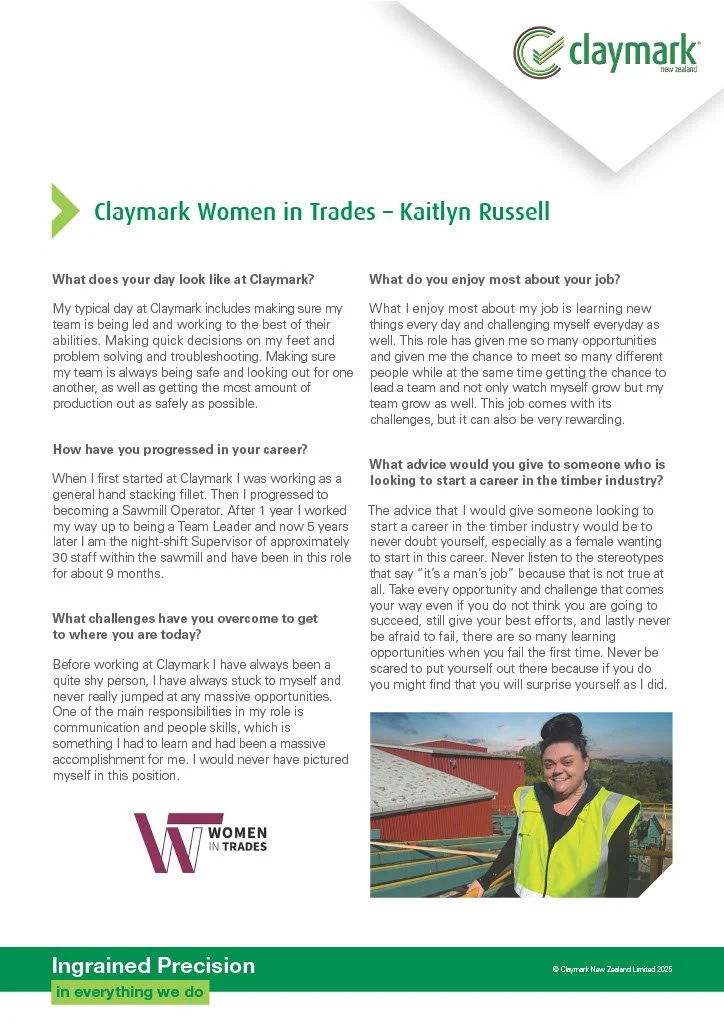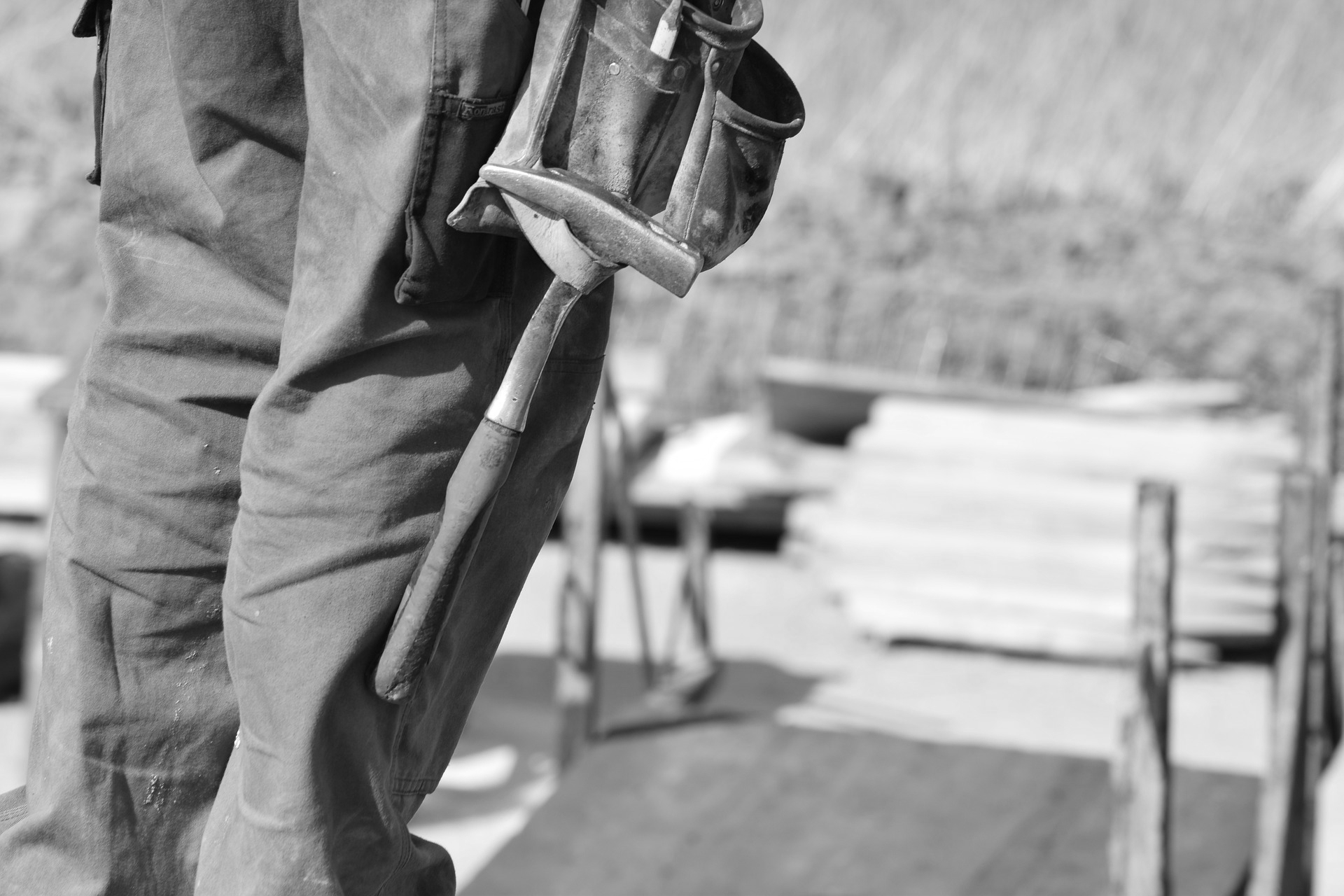
NEWS & INFO
Meet Katarina Sione (Claymark)
At Claymark, people are at the heart of what they do – and they’re proud to support women making their mark in the timber industry.
One of those women is Katarina Sione, who joined Claymark in 2022. In just two years, she has progressed to become a Sawmill Operator and Team Leader, while also studying towards her Timber Machining Level 4 qualification to become a certified Timber Machinist. Read her story below!
We’re stoked to have Claymark on board as a proud sponsor of our Rotorua event.
📍 Novotel Hotel, 1115/1093 Tutanekai Street, Rotorua
🗓️ 18 March 2025
🕙 10am – 1pm
🎟️ Free event
Register now via https://events.humanitix.com/getting-women-in-trades-rotorua
Meet Kaitlyn Russell (Claymark)
At Claymark, people are at the heart of what they do – and they’re proud to support women making their mark in the timber industry.
One of those women is Kaitlyn Russell, who joined Claymark five years ago as a general hand stacking fillet. Read her story below!
We’re stoked to have Claymark on board as a proud sponsor of our Rotorua event.
📍 Novotel Hotel, 1115/1093 Tutanekai Street, Rotorua
🗓️ 18 March 2025
🕙 10am – 1pm
🎟️ Free event
Register now via https://events.humanitix.com/getting-women-in-trades-rotorua
Find out what went down at the latest Taranaki event and more about how to get into the trades!
Watch the video below to see what happened at the recent Taranaki event!
Thank you to the incredible organisations and individuals who made Women in Trades Taranaki 2025 such a success. With over 400 attendees and 35 exhibitors gathered at the TET Stadium in Inglewood, your generous support and active participation helped create an inspiring, hands-on day exploring trades careers.
Principal Sponsors
Keen to explore a career in the trades but not sure where to start? We recommend reaching out to a training provider first. It’s a great way to get a feel for different trades through hands-on learning. Once you’ve found what you enjoy, you can look into apprenticeship opportunities to start building your career. Check out these great organisations supporting training, apprenticeships, and real-world career pathways into the trades!
WITT - Get stuck into real workshops! Learn carpentry, plumbing, electrical and more on campus, then move into an apprenticeship.
Competenz - Earn while you learn! Competenz works with employers to deliver on-the-job training and nationally recognised qualifications. Read about Patsy's journey here!
Māori and Pasifika Trades Training Taranaki (MPTT) - MPTT offers fees-free trades training for Māori and Pasifika individuals aged 16 to 40 in the Taranaki region. Delivered in partnership with WITT and Land Based Training, and coordinated by Taranaki Futures, the programme provides hands-on learning, cultural support, and dedicated mentoring to help learners transition into apprenticeships or employment.
BCITO - Build your future in construction. BCITO supports over 15 trades including carpentry, tiling, joinery and stonemasonry, helping you gain practical, on-site skills while working toward a qualification.
Connexis - Explore careers that keep New Zealand running. Connexis supports training and development across infrastructure industries like electricity, water, civil works and telecommunications.
Earn Learn - Earn while you learn in a real job. This initiative helps young people explore trades careers by combining workplace experience with structured training and wraparound support.
These awesome organisations help showcase what a career in the trades can look like. Many support events, training pathways, and work experience initiatives. Follow them on social media to stay inspired and see what opportunities may be available in the future.
Qube Ports NZ - Explore life at the port, where no two days are the same! Learn to drive forklifts, load containers, and manage warehouse operations in a fast-paced environment.
“Every day is different. Some days I’m on-site inspecting equipment. Other days I’m managing budgets or liaising with contractors and suppliers.”
Maggie de Beer, National Equipment Manager
Qube Ports NZ
Read more about Maggie’s story
Pepper Construction - Thinking about becoming a builder? You could end up on building sites, from houses to offices. Roles include site work, surveying, and supporting major construction projects.
FirstGas / Clarus - Learn how FirstGas helps power New Zealand! From maintaining pipelines to exploring renewable energy solutions, there are heaps of opportunities to grow.
Supporting Sponsors & Partners
Whitaker Civil Engineering - Civil engineering is full of possibilities! Build roads, bridges and utilities—gain site-based experience in civil projects that keep our towns connected.
Mitre 10 Trade – New Plymouth - Get to know the tools of the trade. The team at Mitre 10 Trade New Plymouth supports you with materials, advice and connections across the industry.
Fulton Hogan - Get a behind-the-scenes look at one of New Zealand’s largest infrastructure companies. Fulton Hogan works across roads, water, civil construction and transport, supporting safer and more connected communities.
Fonterra - Learn how dairy products are made and distributed through areas such as logistics, factory operations, and product development.
ICE Electrical - Explore the electrical trade through real-world projects. ICE Electrical offers commercial and industrial services, providing insights into everything from wiring new buildings to sustainable energy solutions.
And don't forget to grab a copy of the Tradie Magazine to stay in the loop! Get news, tips and career guides for all kinds of trades, from tools and tech to site safety and apprenticeship advice.
Special Acknowledgements
“The day was a huge success with the highest turnout in its third year,” says Katrina Mayo, event organiser and Work Based Learning Lead at WITT Trades School. “It’s an empowering forum for young women to connect with experienced tradespeople and see real pathways into the sector.”
“Women in Trades was fantastic—just for the girls with no pressure of boys looking on,” reflects Kerrie Thomson-Booth, Deputy Director, WITT Trades School.
Read more about the day here: https://www.witt.ac.nz/news/women-in-trades-boots-and-all/
Interested in future events? Follow Women in Trades on social media to see where we’re headed next:
📸 Instagram @womenintradesnz
📘 Facebook @womenintradesnz
🔗 LinkedIn @Women in Trades NZ



















Meet Maggie de Beer
You can hear Maggie tell her story at the Women in Trades Taranaki event 22 May 2025!
Maggie began her career as a temporary employee during school holidays at a local engineering firm in her hometown in South Africa. At 18, she was offered a receptionist role with the company. Over the years, she held various positions, with her last title being Junior Financial/Executive Assistant, supporting the Senior Leadership teams.
In April 2019, Maggie and her husband moved to New Zealand. She was fortunate to join another engineering firm the same year, starting as the Port Equipment & Production Administrator. In 2021, she was promoted to Assistant Project Manager, and in 2022, she advanced to the role of Port Product Project Manager. In 2024, she embarked on her current journey as the National Equipment Manager for Qube Ports NZ.
What's your trade and how long you have been working in the industry?
Maggie is the National Equipment Manager for Qube Ports NZ. She has worked in Mechanical Engineering industries for over 19 years.
Maggie started her career working admin jobs at a local engineering firm during school holidays. She was offered a receptionist role — but to be honest, she had no idea what she wanted to do. She studied part-time, first in business management, then specialising in finance — because, back then, admin and finance were the paths women ‘were good at,’ right?
But working closely with companies like Komatsu, Liebherr, and Caterpillar across Africa, she realised if she wanted to grow, she needed to understand the technical side. She made it her mission to learn as much as she could about manufacturing and engineering, and was lucky to have some managers who were willing to teach her along the way.
After moving to New Zealand, she joined a port equipment engineering firm — again starting in admin, but quickly stepping into more technical work. Luckily this time she had an amazing manager — over the 4 years that she worked for him, he was willing to see past the male "mold" and see her technical skills and offered her every opportunity to learn everything about port products, drawings, manufacturing, job management, project management, costing and general engineering.
It was then she realised — she should have done a mechanical engineering trade! Even without it, she fought hard to prove herself, build her technical skills, and find her place in an industry she loves — as she was often the only female in meetings, design reviews, workshops, and offices.
This is her reason for wanting to participate — because she believes her journey and roles could inspire women to enter industries they may not know they belong in, just like she felt when she started her career. Having worked with many people in trades, but only five female Mechanical Engineering Apprentices in over 19 years.
How did you get your job/apprenticeship
When Maggie arrived in New Zealand, the Port Equipment Administrator role had just become vacant. She applied, got the job — and that’s where her official journey in New Zealand’s engineering industry began.
Where did you complete your apprenticeship/training with?
Maggie studied through the University of South Africa while working full-time, and completed her final Honours paper in 2020 at the University of Auckland.
How have you progressed in your career?
Maggie started in an administration/reception role at age 18, working and studying part-time. She managed to move into leadership in engineering-heavy industries, breaking barriers as the first female project manager for a major engineering firm, managing million-dollar engineering projects nominated for safety awards in NZ that have changed the NZ Stevedoring waterfront to what we know it to be.
Today, she’s proud to be the first female National Equipment Manager for Qube Ports NZ’s mechanical engineering division.
What do you do everyday at work?
Every day is different. Some days Maggie is out on-site at ports, inspecting equipment, meeting with operations teams, and ensuring maintenance programs are running properly. Other days she’s managing budgets, working on major equipment projects, or liaising with contractors and suppliers.
She also manages a national, all-male team — which comes with its own unique leadership challenges and rewards. The balance between technical problem-solving and strategic planning keeps her engaged and always learning.
Who inspired you to choose this career?
It wasn’t one person — it was the industry itself. Finding new ways to improve how they operated, making the work safer for their people, and adding real value to the business got Maggie into engineering. It made her passionate about changing the way things are done today so that tomorrow’s operations are smarter, safer, and more efficient.
Being able to drive that kind of positive change across their ports and logistics network is incredibly rewarding, and it’s what keeps her excited about coming to work every day.
Some good examples are:
A Telematic system — being able to see a solution that their technical team had not even thought of at the time, Maggie was able to develop, test and install these units into their Port Product Range. This was a first for the business and allowed her to roll out and commission 32 machines nationally and growing.
A simple cradle design that allows them to move their gear to and from the berth safely.
What challenges did you have to overcome to get to where you are?
One of the biggest challenges Maggie faced was backing herself when stepping into industries or roles where she didn’t ‘fit the mold’ on paper. She started as a receptionist at 18, studied financial management, and worked her way into admin, assistant project manager to project management and then equipment management — stepping into technical and leadership roles without a traditional trade qualification, and in industries dominated by men.
Looking back, she can honestly say she wouldn’t be where she is today without a few good mentors who believed in her – especially at times when she struggled to believe in herself. Early in her career, she had managers who didn’t just see the admin title on her business card – they saw her potential to understand technical work, to lead projects, and to step beyond what she thought she was capable of. Their support helped her build not just technical skills, but confidence and trust in her own leadership style.
Maggie is sure there will always be moments of self-doubt, and times where she will need to prove her capability. But this journey taught her that career paths don’t have to be linear to be powerful. It’s a big part of why she’s passionate about encouraging more women into industries like theirs – because sometimes, all it takes is one person seeing what you can’t yet see in yourself.
What do you love most about your trade?
What Maggie loves most about her role is the variety and the impact. As National Equipment Manager, no two days are the same — she’s working across ports, supporting operations, solving problems, and making sure their equipment strategies actually make a difference on the ground.
Being part of innovation, she loves that she gets to blend technical understanding, leadership, and business skills to help teams work safer and more efficiently.
Meet Ashley L’Heureux
What trade are you in, and how long you have been working in the industry?
Ashley L’Heureux is qualified in Mechanical Engineering, Maintenance Engineering Level 4. She is now a Mechanical Pipeline Technician at FirstGas, Clarus, and has proudly been part of the industry for 5 years.
What was your previous career and how did you get into the trades?
Ashley says she is proof that it’s never too late to change your career. She attended both college and university in Canada, where she was born and raised, and has both her diploma as a Registered Veterinary Technician and a Bachelor of Science in Animal Biology.
She has worked at many different jobs in her life — some include summer student at Toyota Motor Manufacturing Canada, cashier, waitress, bartender, horseback riding tour guide… she’s even worked with camels. Variety is the spice of life, Ashley says.
Before signing up for her apprenticeship, Ashley was working as a vet nurse. She says she loves animals, always has and always will, but knew that the industry she had dedicated most of her education to was no longer what she wanted to do for the rest of her life. She had what they call ‘compassion fatigue’ and was looking for a change she could settle into for the remainder of her working career.
So, she hopped onto Seek and started her search. Stumbling upon the First Gas apprenticeship, she decided to apply — the rest is history.
How did you get into the Trades?
Having seen the ad on Seek, Ashley decided an apprenticeship was an amazing way to get into the industry. Not only was she going to be able to gain a free education, they were going to pay her while she was learning — much different from what she was used to with her previous education.
Ashley was contacted later about coming in for a group interview process. It was fun and different to what she had ever experienced… and then shortly after that she was offered an apprenticeship. How have you progressed in your career? Starting as an apprentice, Ashley became an assistant and then became a qualified mechanical pipeline technician.
What do you get up to day-to-day at work?
It’s so varied. Ashley says they do so much all over the North Island. In the first couple of years of her apprenticeship, she travelled quite often for work and was able to see quite a few sites and compressor stations, being exposed to different equipment and procedures.
She was a part of the pigging team (pipe cleaning) for 8 weeks, did a secondment with Entec to gain more mechanical experience associated with her apprenticeship for 8 weeks, and attended a couple of block courses through Competenz.
An average day can consist of meter runs and odourant runs, maintaining equipment that regulates the gas for distribution — for example: regulators, slam shuts, water bath heaters, pressure relief valves, main line valves, etc.
Who inspired you to choose this career?
Her hubby — he had been in the industry for many years before they met.
What challenges did you have to overcome to get to where you are? Ashley started from scratch, right from the bottom up. Because her background had nothing to do with this industry, there wasn’t much knowledge she could bring over. When she first started, she was teaching herself the names of tools. There was a huge learning curve to overcome.
She also thinks being an older apprentice, sometimes people subconsciously thought she would know things. Other than that, it was just the usual new job/new people hurdles — not much to overcome really.
What do you love most about your trade?
Being the boss of her own area and sites, being outside, and being on the tools.
Taranaki Event Announced!
📅 Date: Wednesday, 22 May
⏰ Time: 10:00 AM – 1:00 PM
📍 Location: TET Stadium and Event Centre, 1 Elliot Street, Inglewood
Register now! ⬅️ ⬅️ ⬅️
- Not sure what career path to take? Looking for a job that’s active and rewarding?
- Do you like working with your hands and using technology?
- Want to help shape your community’s future and be proud of your mahi?
🚧 COME AND TRY OUT A TRADES CAREER! 🔧
After last year’s success, we’re back with another action-packed event to show you how awesome a career in the trades can be!
What to Expect:
- 10:00 AM – Give a trade a go! Try hands-on activities and meet industry training providers, employers, and organisations.
- 1:00 PM – Panel speakers & prizes! Hear from tradeswomen who are thriving in the industry and be in to win some sweet prizes!
Why Attend?
- Meet employers, training providers, and industry organisations.
- Hear from a panel of tradeswomen who are making their mark.
- Learn the next steps to start your career in the trades.
🎟️ FREE EVENT – Don’t miss out!
Want to sponsor or be an exhibitor? Click here or contact whitney@womenintradesnz.com


















Meet Patsy Gadsby
From fictional muse to real-world apprentice – Patsy Gadsby is making her mark, inspired by an animated character in a fantasy television series.
Once a jack of all trades and now an aspiring engineer, Patsy attributes Avatar The Legend of Korra to propelling her into the trade. “I worked as a cleaner and in a bakery, I studied to be a make-up artist and spent three years as a postie, but it was during the six months I spent jobless watching Avatar that I finally worked out what I wanted to do,” she says.
Keep reading over at the Tradie New Zealand Magazine!
Meet Natalia Ioane
I'm a 4th year apprentice Plumber, Gasfitter and Drainlayer and i've been working in the industry for 5 years.
Before Plumbing, I was a student at Otago University on a scholarship with ambitions to become a dentist. Study life full time wasn't for me so I came home and worked at a local butcher shop doing retail. Then, I was 19 and knew I needed a 'hands on' type career so I chose Plumbing and job a for life guaranteed.
Tell us about how you got your job/apprenticeship.
I approached my previous company I used to work for in person expressing my interest in becoming a plumber and asked to do some work experience to get an idea of what its like. After that I was hired in a full time position on a labouring contract for 6 months then signed up for my apprenticeship.
How have you progressed in your career? I'm now confident enough to be left alone and complete small tasks on my own. I've learnt so much over the past 4 years and still yet have alot more to learn.
I gained lots of experience from my previous company in residential maintenance for the first 3.5 years of my apprenticeship. Day to day I was doing 3/5 jobs a day on average with a tradesmen helping the boys fix leaks, replacing leaking hot water cylinders, servicing gas appliances, clearing blocked drains and much more. Last year I moved onto commercial plumbing, doing new installs on the big sites. This gave me more of an understanding working with the Building Code and Standards which is beneficial for my exams.
What you get up to day to day at work? A normal day for me is going through plans, running waters inside the walls and ceiling's and waste pipes in preparation for pre line inspections. We're currently working through 1st fix.
One big challenge I had to overcome was dealing with the doubt of other people. A lot of people were questioning why I chose plumbing and why the trades in general suggesting that its a bad idea. I put all those opinions aside because I already made up my mind that this what I wanted to do.
My most proud career achievement is:
Piping out my first mains hot water cylinder on a job on my own and inspiring other women to get on the tools.
My future career goals are: To be certified in all 3 of my trades and gain my backflow certification license.
My career has definitely given me thick skin. My hobbies fit perfectly around my work since my hours are 7am to 4pm - so it gives me a good chunk of my evening to go to the gym or catch up with family/friends.
What worked well for me personally was doing the Pre Trade Plumbing course with Te Pukenga. It meant that I had the very basic knowledge of how to connect various pipes we use,I would highly recommend you learn how to drive manual and be confident as most trade vehicles aren't guaranteed to be automatic. At minimum, have a restricted license sat in manual transmission and get your full license as soon as possible.
If you're thinking about doing a trade, stick with it, apply yourself and work hard!! Its not easy being a woman in a world of men, but the world is your oyster!! Grab the opportunity and you'll grow not only in the industry, but as a person as well with the character development. The opportunities are endless in the trades! Bite the bullet and go for it.
Meet Amy Howell, Owner of Wallflowers
What is your trade and how long have you been working in the industry?
Wallpaper Installation/Paperhanging
My business is 7 years old
Tell us about previous careers if you have them and why you changed to your trade.
I’ve done a bunch of different things – print production, event management and my last career before changing to my trade was Vet Nursing, which I loved but it felt like there was nowhere to go with it and the money wasn’t great. I wanted to work for myself and work with my hands, whilst getting ahead financially
Tell us about how you got your job/apprenticeship.
There’s no real apprenticeship for Paperhanging. Painting & Decorating apprenticeship does cover some wallpapering but from my understanding it’s not a lot. My only way in was to work for a paperhanger. After going around some of the shops that supply wallpaper and talking to them, I got a few numbers to call. I called Mark and convinced him to take me on, he was reluctant at first but we soon became a good team and worked together for a while. I was honest with him about wanting to work for myself and he was happy to pass on his skills. I worked for him for several months, whilst slowly starting to get my own jobs
**How have you progressed in your career? **
Starting out as a business owner and installer everything was learned job to job, I kept thinking if I can pull this hard job off then I’m winning and just kept progressing from there. Lots of highs and lows and always still learning
What do you get up to day to day at work?
Every day is a different install. Unless we are working on a commercial job then we can be on the same site for a while. While the process is generally the same, each paper and space is different. There’s a lot of planning and prep that goes into a good install.
Who inspired you to choose this career?
There wasn’t really anyone initially that inspired me but I was intrigued about this relatively unknown trade that was having a resurgence but there didn’t seem to be many installers
Taking the risk and starting something completely new was scary but I would say it was the support of my family and friends that helped. Especially my parents who were really encouraging even though it seemed like a crazy decision at the time
What challenges did you have to overcome to get to where you are?
Learning everything from scratch, putting myself out there, imposter syndrome, entering a male dominated world, learning to run a business, trying to juggle everything
What do you love most about your trade?
I love how it can quickly transform a space and how stoked my clients are.
I love the precision and attention to detail
I love the contact with all the different people – clients, designers, architects, builders, other trades and the suppliers.
I love being able to run my own schedule and the freedom that gives me to live a more balanced life, or work my ass off when needed
My most proud career achievement is:
Probably installing a gold leaf hand painted De Gourney mural on a circular column for a jewellery store, that was tricky
My future career goals are:
Keep getting better at my craft and trying to keep that life work balance in check
Some things I wish I had known when I started:
I just wish that when I was 16 and confused about what to do when leaving school that I knew starting a trade was an option, it was never an option back then. That has changed a lot now, and I’m excited to see how more woman entering the trades changes the industry
**Has your career choice impacted your life outside work? **
New hobbies, confidence, or opportunities, or maybe less time to yourself, needing to juggle home life/sports to fit with shifts for some examples.
I think its been good for my sport/activities because I can juggle it round to suit me. When the surfs good at home I’ll start work later or finish early. Sometimes it doesn’t work out because of deadlines etc but I know I’m happier and more efficient if I’ve had time to go do the things I love
The only thing is that I always struggle to keep on top of all the admin that comes with running a business. Emails, quote, invoices. Constant changing around the schedule to make everything work. I come home from work some nights and spent hours doing admin but you get used to it, always chasing your tail
**What advice would you give someone looking to get into your line of work? **
Hustle…hustle…talk to everyone in the industry, find someone you want to work for and approach them. Nothing ever comes to you, you have to work hard for it
Anything we haven’t asked that you think potential tradies would like to hear?
Working in the trades would suit someone that likes to be on their feet all day, work with their hands, get stuck it. I love having a job that’s tangible…you see what you have done each day and it feels good. There are challenges you are faced being a woman on sites but most people are cool and the culture is changing – it’s becoming more diverse and inclusive. It can be a little intimidating when you start out but once your confident in what you do, you won’t care about that.
Who inspired you to choose this career?
There wasn’t really anyone initially that inspired me but I was intrigued about this relatively unknown trade that was having a resurgence but there didn’t seem to be many installers
Taking the risk and starting something completely new was scary but I would say it was the support of my family and friends that helped. Especially my parents who were really encouraging even though it seemed like a crazy decision at the time
What challenges did you have to overcome to get to where you are?
Learning everything from scratch, putting myself out there, imposter syndrome, entering a male dominated world, learning to run a business, trying to juggle everything
What do you love most about your trade?
I love how it can quickly transform a space and how stoked my clients are.
I love the precision and attention to detail
I love the contact with all the different people – clients, designers, architects, builders, other trades and the suppliers.
I love being able to run my own schedule and the freedom that gives me to live a more balanced life, or work my ass off when needed
My most proud career achievement is:
Probably installing a gold leaf hand painted De Gourney mural on a circular column for a jewellery store, that was tricky
My future career goals are:
Keep getting better at my craft and trying to keep that life work balance in check
Some things I wish I had known when I started:
I just wish that when I was 16 and confused about what to do when leaving school that I knew starting a trade was an option, it was never an option back then. That has changed a lot now, and I’m excited to see how more woman entering the trades changes the industry
**Has your career choice impacted your life outside work? **
New hobbies, confidence, or opportunities, or maybe less time to yourself, needing to juggle home life/sports to fit with shifts for some examples.
I think its been good for my sport/activities because I can juggle it round to suit me. When the surfs good at home I’ll start work later or finish early. Sometimes it doesn’t work out because of deadlines etc but I know I’m happier and more efficient if I’ve had time to go do the things I love
The only thing is that I always struggle to keep on top of all the admin that comes with running a business. Emails, quote, invoices. Constant changing around the schedule to make everything work. I come home from work some nights and spent hours doing admin but you get used to it, always chasing your tail
**What advice would you give someone looking to get into your line of work? **
Hustle…hustle…talk to everyone in the industry, find someone you want to work for and approach them. Nothing ever comes to you, you have to work hard for it
Anything we haven’t asked that you think potential tradies would like to hear?
Working in the trades would suit someone that likes to be on their feet all day, work with their hands, get stuck it. I love having a job that’s tangible…you see what you have done each day and it feels good. There are challenges you are faced being a woman on sites but most people are cool and the culture is changing – it’s becoming more diverse and inclusive. It can be a little intimidating when you start out but once your confident in what you do, you won’t care about that.
Meet Bee Croft, Carpenter with JFC
Growing up in Palmerston North, Bree Croft knew from a young age that her career would be outdoors; office life just didn't seem like fun. Straight out of high school, Bree wanted to join the trades, but feeling shy and unsure about joining, Bree began her first job in a daycare alongside her mum. Earning money felt good, but after a while, Bree felt the urge to give carpentry a go. Despite being nervous about the unknown, Bree set out to take her next career step.
As Bree says, "It was still scary, but I thought, you're older now and more mature. Put on those big girl pants and go for it. Otherwise, I was just going to stay somewhere I wasn't happy". Bree started carpentry training with ELE Workforce, which offered a pre- apprenticeship programme for Maori. Through ELE, she was placed with John Fillmore Contracting (JFC) on a large-scale earthworks development for Fisher & Paykel in Highbrook. Shortly after starting, Bree was offered a job with JFC but initially declined to continue her carpentry path. Her manager then explained the value of exploring different construction areas as a young person, and that she will get carpentry exposure on civil projects. Taking this advice, Bree signed a contract with JFC and began her career in civil construction.
Upskilling and building confidence
Bree has been working on the Westhaven Seawall Upgrade in Tamaki Makaurau Auckland. The project is in its early stages, so over the past two months, she has worked on ducting, concreting, road rehabilitation, and carpentry with on-site formwork. There are many opportunities on a JFC project, allowing everyone in the team to constantly learn and upskill. Applying her new skills gained from the Fisher & Paykel site, Bree confidently participated in the ducting portion of the project.
Whanau life
Working further away from home can be challenging for Bree, who has a young family. However, looking at the bigger picture, Bree is confident that what she does is worth it. Her family's support has kept Bree going. Flexible work hours on some days help Bree and her family manage and keep weekends for family time.
Advice to young tradies in the making
"If it's something you're interested in and passionate about, why not do it? You need to be happy at work and enjoy what you're doing. Taking the first step is the hardest, but it becomes easy once you're there and settle in."
Initially, asking questions was tough, but now Bree encourages it. "Even though you can help out on-site, you need to think about why you are doing it this way; everything's got a reason." She also says to build good relationships with your team and management and learn maths while you can!
Surprise yourself!
"My biggest achievement is having the courage to do this. I'm a very reserved person; I go with the flow. People who know me can't believe I did this. I'm not the type to get out of my comfort zone, but finding the confidence to do it feels good."
Looking ahead
Bree has joined the JFC's in-house Training Academy for skilled labourer pathway, offering on-site practical learning and formal qualifications. JFC offers many different roles and opportunities. A project manager has advised Bree to pair herself with a carpenter to further her basic skills. Most projects involve rough carpentry throughout, allowing Bree to continue with basic skills and use hand tools. More complex finishing and detailing are required for the construction of elaborate structural features of streetscape projects, which offers another opportunity for Bree to keep exploring her interest in carpentry. JFC are always looking to hire the right people. If you're interested in working in construction, all you need to bring is a hardworking and team player attitude, and we will teach you the rest. Apply online at www.jfcltd.co.nz/careers
-JFC
CONTRACTOR OF CHOICE SINCE 1968.
